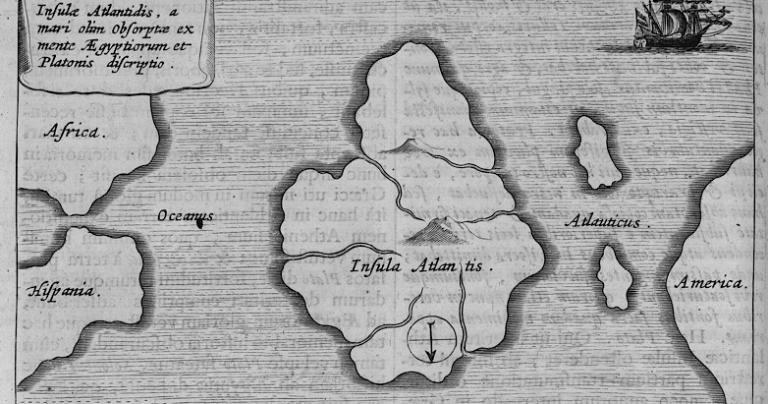
A story like Atlantis is not historical, more like the Lord of the Rings than the Gospel of John or Thucydides’ History of the Peloponnesian Wars. Instead, stories like Atlantis fill in the history we have lost in deep time*. Socrates wants to see the ideal in motion, but history will never give us the ideal. We are broken. History, as the Bible shows, gives us flawed King David. Yet still humankind needs tales, like that of Arthur, to fill the gaps.
The search for such a story leads the Greeks to Egypt, mother Africa, where humankind goes to be born. There they hear a story, not history, but a myth of origins.
‘You are young,’ the old priest replied, ‘young in soul, every one of you. Your souls are devoid of beliefs about antiquity handed down by ancient tradition. Your souls lack any learning made hoary by time.
We live history, are saved by reality, but gain hope, a vision of where reality might be found, by the hypothetical history that is well told. Plato, Dante, Tolkien did this well. . . Lovecraft not so much.
The oldest building in Britain makes an American tourist realize how young his nation is, but then a visit to Greece makes even ancient Britain juvenile, then Egypt beckons where mature takes on a new meaning. Mother Africa beckons with stories of human childhood. We do not know, we cannot know, the lost loves of mothers and fathers in mother Ethiopia or the struggles of a city against barbarism in the heart of Africa centuries before the pyramids were reared.
This is the severe mercy of heaven lest we despair. In the school of souls that is this life, nothing is new. Evils are defeated in the village only to be renewed in another generation. Only God can know all and know hope. He knows all history and the end of history sitting timelessly on His throne. The pattern is not endless and the arc of history is Godward.
Yet we are young, Plato is right. We are born and live. Our lives matter to us and to God. They will not be forgotten by Him, though human history will record little of what we say or do. We do not matter much to human history and are not even worth recording in the sweep of deep time.
God has given us “sacred history” and the ability to do science to help mind the gaps, but a second tool is imagination. We postulate and tell myths. These are not “true” indeed, but if told well are true in intent. Minis Tirith is Constantinople without the (needed) historic and moral complexity.
Human history doesn’t give us icons, hagiography does. This is sacred history where we double down on the good as an example to us.
The “likely stories” we tell ourselves about the world matter. Most of human history is lost, unwritten, unrecorded, unmemorialized. We are awash with data about our dotage, but know next to nothing of the childhood or youth of humanity. Those tales, loves, and lives are lost as history.
This is where we must tell “likely stories” or myths to fill the loss. Different eras picture this unrecorded history (this state of nature) differently. Some make our ancestors savages, others have mythologized the unwritten past as being the way they wish we are. Novelists have told stories of matriarchies, white supremacy, free love: we have invented a past as we must. Are we ascending from brutes as secular Victorians believed? Or are we fallen from a Golden Age as the Greeks thought?
We must tell such stories and good myth makers can save us from serious errors or present us with splendid opportunities.
When philosophers thought about human origins, how they pictured the “state of nature” before the coming of the state shaped what they thought of the role of government. Locke did not think our pre-history was so bad, Hobbes thought it horrible. Locke justified revolution in some cases against a bad government, because even the worst, a return to the “state of nature” was bad, but not horrid. For Hobbes, there was no government that could be worse than the nasty, brutish times before government.
Locke was more deeply Christian and so salvation history helped him. Thank God.
We are all young and even the deepest time, the moment of the start of the cosmos, is nothing to timeless God. God is I AM and after cosmic cold death will be I AM. He is the alpha and omega of time.
We tell stories, some very old, but we are all young before God. Thank God that He is good and a father to us.
——————-
*Whether one is “young earth” or “old earth,” most of history is lost. It would merely be a matter of degree. Sacred Scripture preserves an outline of salvation history, but even so much is lost that would not have been forgotten in a better world. We are chronologically lonely: cut off from our ancestors by death.
















